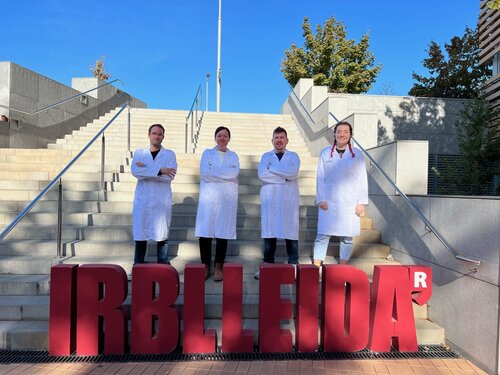An IRBLleida project, selected as a Collaborative R&D&I Project in Catalonia
It is part of the Complementary Plan for Biotechnology Applied to Health
The project 'Validation of BP-EVs as a next-generation compound delivery platform for targeted release within the Central Nervous System (EVBRAINTARGET)' led by the head of the +Pec Proteomics research group at the Biomedical Research Institute of Lleida, Xavier Gallart, has been one of the 16 Collaborative R&D&I Projects in Catalonia selected within the framework of the Complementary Plan for Biotechnology Applied to Health. This Plan will have a total budget of more than 3.5 million euros from the Ministry of Science and Innovation and the Generalitat de Catalunya, with the collaboration of NextGenerationEU funds.
The Complementary Plans are a new instrument of the Ministry of Science and Innovation aimed at establishing collaborations with the Autonomous Communities (CCAA) in R&D&I actions, with the aim of creating synergies, aligning the execution of funds and establishing common priorities.
The Complementary Plan for Biotechnology Applied to Health is a strategic research programme channelled through the so-called Complementary Plans of the Recovery and Resilience Mechanism, and is aimed at developing tools for diagnosis, prognosis and advanced (or targeted) therapies in personalised medicine. It is co-financed and co-governed by the Autonomous Regions themselves, to tackle some of the greatest health challenges, such as cancer, diseases associated with the ageing process, infectious diseases and minority diseases.
To meet these objectives, the project currently involves public and private non-profit organisations from seven autonomous communities, including: Basque Country, Catalonia, Castile-La Mancha, Galicia, Extremadura, Andalusia and Aragon.
This biotechnology health research consortium is one of the largest in the history of Spain, and one of the best funded, with a budget of more than 37 million euros.
From the first call to form alliances between Catalonia and other autonomous communities and present Collaborative Projects, the State Scientific Committee of the Complementary Plan, coordinated by IBEC, has prioritised 16 projects to be carried out between 32 basic and clinical research entities: 20 from Catalonia, 4 from the Basque Country, 3 from Galicia and 5 from Andalusia.
These Collaborative Projects will promote research in personalised and precision medicine of the future, fostering collaboration between basic and clinical science research entities, with the aim of accelerating the clinical translation of knowledge acquired in the laboratory. The 3.5 million euros will be spent mainly on:
- The development and implementation of integrated artificial intelligence models with which it will be possible to predict the risk of certain diseases, such as Type 2 diabetes, in order to establish clinical prevention protocols based on the lifestyle of each individual.
- The creation of new strategies for the development of therapies against breast cancer through single cell transcriptomic techniques, contributing to a better understanding of the complex mechanisms governing the interactions between tumour and immune cells.
- The development of new methods for drug screening to help accelerate the discovery of new therapeutic targets for the treatment of various diseases (primary tumours of the nervous system, Fanconi anaemia, etc.).
- The use of different cellular models in the search for new therapeutic options for certain diseases, such as, for example, bone cancer in young patients.
- Progress in the development of preclinical human models (organoids) that reproduce different stages and the physiopathology of diseases, such as non-alcoholic fatty liver disease, in order to identify new therapeutic targets and drugs for their treatment.
- The promotion of new approaches for the treatment of Alzheimer's disease, through the use and study of nanomedicines that can cross the blood-brain barrier and their use in animal models and in vitro.
- The development of advanced techniques to improve surgical processes, such as advanced biomechanical models for maxillofacial surgery, and virtual and augmented reality and 3D printing techniques, in order to carry out simulations and practice in complex surgical processes in paediatric oncology.
- To carry out these actions, the funding of the Complementary Plan will allow the incorporation of 20 researchers, contributing to the recruitment and training of highly qualified personnel in the biomedical sector. The selection process, coordinated by IBEC, will be open between 22 November and 22 December.
The Institute for Bioengineering of Catalonia (IBEC) has been the coordinator of the State Scientific Committee.

Image of +Pec Proteomics research group






